We may not have the course you’re looking for. If you enquire or give us a call on 01344203999 and speak to our training experts, we may still be able to help with your training requirements.
Training Outcomes Within Your Budget!
We ensure quality, budget-alignment, and timely delivery by our expert instructors.
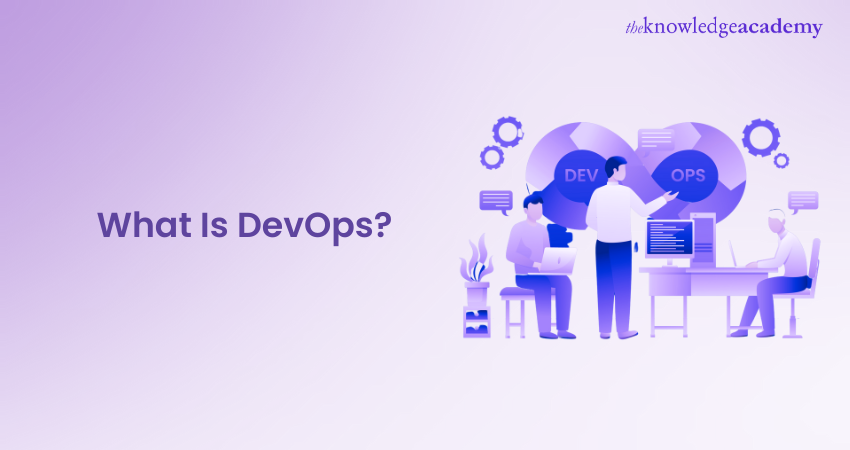
When it comes to Software Development and IT operations, DevOps has revolutionised the way organisations build, deploy, and manage their applications. But What is DevOps, and why is it so important? Let's find out!
In this blog, you will learn What is DevOps, its importance, different stages, and various tools involved. Let's dive in deeper to learn more!
Table of Contents
1) What is DevOps?
2) Why DevOps is Importance
3) DevOps stages
4) DevOps Tools
5) DevOps vs Agile
6) Challenges in DevOps
7) Roadmap to become a DevOps Engineer
8) Conclusion
What is DevOps?
In today’s era, Software Development is the backbone of the digital world. It’s the plinth of various software deliverable activities, as the process is about designing, coding, testing, documenting, finding the bug, and working on it. DevOps can be expanded as Development and Operations. DevOps, basically an application delivery, can also be denoted as a philosophy or mindset that optimises and accelerates the building modules more precisely.
The “Dev” in DevOps is a methodology to work on streamlining processes, whereas “Ops” is all about infrastructure modelling. Despite the significant contributions that developers and operations specialists made separately to projects, it led to a deadly malfunction in the industrial outputs. To answer this, DevOps was coined as a solution to guide the working ways in which the development phase to production. DevOps Projects effectively unified the Software Development approach resulting in improved efficiency.
Why DevOps is Importance?
From rapid deployment to reduced risks, DevOps is very important in today's technological landscape. Let's explore What is DevOps importance:
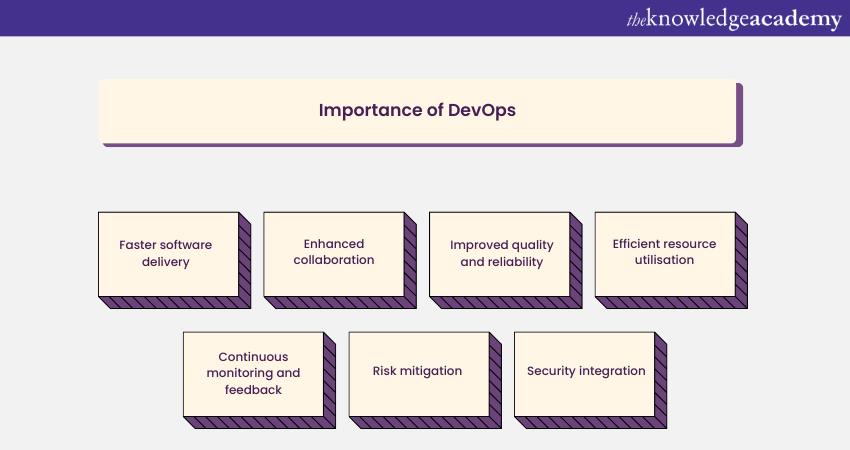
1) Faster software delivery: DevOps emphasises automation and Continuous Integration/Continuous Delivery (CI/CD). This approach speeds up the Software Development Lifecycle (SDLC), allowing for more frequent and reliable releases. Teams can respond to changing market demands and customer feedback rapidly.
2) Enhanced collaboration: DevOps breaks down the traditional silos between development and operations teams. It fosters a culture of collaboration, transparency, and shared responsibilities. Teams work together to solve problems and deliver value to the organisation.
3) Improved quality and reliability: Automation of testing and deployment processes ensures that software is thoroughly tested and reliable. This leads to a reduction in production defects and, in turn, enhanced customer satisfaction.
4) Efficient resource utilisation: DevOps practices optimise resource usage. By automating processes and scaling infrastructure as needed, organisations can achieve cost savings and greater efficiency.
5) Continuous monitoring and feedback: DevOps promotes continuous monitoring of software in production. Teams can identify and address issues proactively, improving system performance and stability. Customer feedback is integrated into development, ensuring that the software meets user expectations.
6) Risk mitigation: DevOps practices encourage smaller, incremental changes to the software. This reduces the impact of potential failures and allows for quicker recovery in case of issues.
7) Security integration: Security is integrated into the development process from the beginning. This approach ensures that security issues and vulnerabilities are addressed early in the development cycle.
Overall, DevOps is very important, and organisations that adopt its practices are better equipped to meet the demands of a digital world. It helps them deliver value to their customers while maintaining a competitive edge.
On a side note, “Importance of DevOps” often featured among the Top DevOps Interview Questions on many interviews. So, if you aspire to become a professional in this domain, learning about it can give you an edge over others.
Improve your SecOps skills through our Certified SecOps Professional Course.
DevOps Stages
DevOps is a set of practices and principles aimed at bridging the gap between Software Development and IT operations. The stages in DevOps encompass various aspects of the Software Development and delivery process. Let's explore What is DevOps’ different stages are:
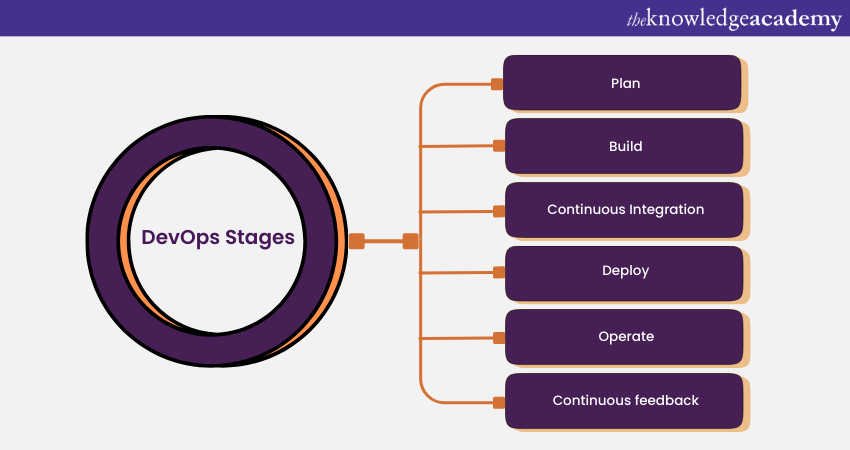
1) Plan: The DevOps process begins with careful planning, where project objectives are defined and the development roadmap is established. Key decisions about architecture, technologies, and tools are made to ensure alignment with the project's goals.
2) Build: In the build phase, Software Development takes centre stage. Developers write and collaborate on code, with a focus on quality and best practices. This stage is where the software application comes to life.
3) Continuous Integration: Continuous Integration (CI) involves the ongoing integration of code changes into a shared repository. This practice ensures that code changes are frequently tested and validated, contributing to a consistent and reliable codebase.
4) Deploy: Deployment is the pivotal phase where the software is released into the intended environment. This could be a production server, cloud platform, or containerised system. Automation is employed to ensure predictable and error-free deployments.
5) Operate: In the "Operate" stage, the software is up and running, and operations teams take over. They continuously monitor the system to ensure it functions smoothly. Should any issues arise, they troubleshoot and resolve them promptly to maintain system reliability and performance.
6) Continuous feedback: The "Continuous Feedback" stage is an ongoing loop throughout the entire DevOps process. Information from monitoring, user feedback, and testing is used to drive improvements and enhancements. This iterative approach leads to the development of new features, bug fixes, and infrastructure optimisations, creating a cycle of continuous refinement in the Software Development and deployment process.
These DevOps Stages highlight the importance of collaboration between development and operations teams. It stresses the importance of using automation to streamline processes for Software Development and improvement. The ultimate goal of DevOps is to deliver high-quality software efficiently, respond rapidly to changing requirements, and continuously enhance the software based on user feedback.
DevOps Tools
DevOps tools represent the working phase of the DevOps Lifecycle. There are two approaches in the DevOps Toolchain. An All-in-one toolchain doesn’t prefer any third-party apps and has a complete resolution, and with an open toolchain, customisation is possible. Let’s explore the important DevOps Tools:
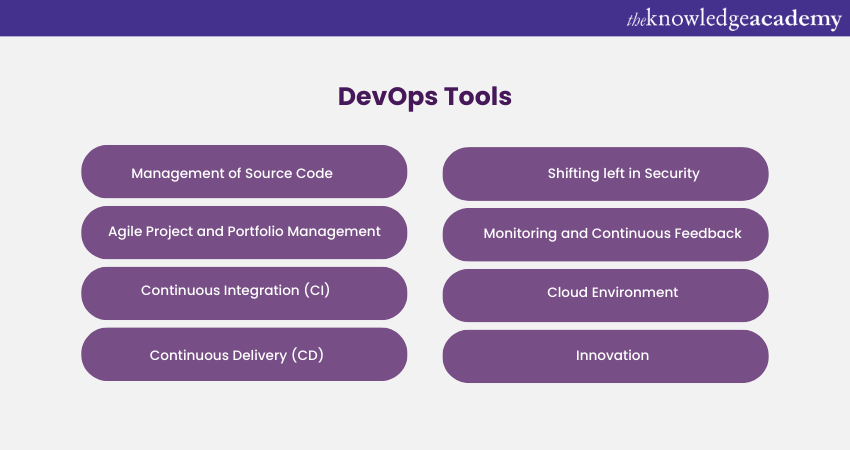
A) Management of Source Code: These teams look forward to coordinating with the management updates to large websites, online applications, codes, configuration, and metadata, as well as other collections of data, among different teams.
B) Agile Project and Portfolio Management: The source code is presented in an artefact for testing object-based outputs and version control, as Artifact management denotes good practice culture. JFrog Artifactory and Nexus Repository are two instances of artifact repositories.
C) Continuous Integration (CI): Continuous Integration (CI) is the nucleus of the DevOps cycle, which is proceeded by the delivery process. The stages involved in Continuous integration are as follows:
1) Perform/Commit
2) Build
3) Test
4) Stage
5) Deploy Dev/QA
6) Production
Continuous Integration helps to build and test the automation process, thus reducing the manual load and focusing more on Integration and other processes. These processes are checked frequently to avoid difficulties in later stages.
D) Continuous Delivery (CD): Delivery is more into deploying applications for a productive environment through a Continuous Delivery Platform. DevOps Delivery team follows:
1) Establishing a management procedure that includes distinct manual approval stages.
2) Set up automatic gates to advance applications through different phases until they are released to clients.
3) Automation is practiced to make delivery procedures more scalable, repeatable, controllable, and thoroughly tested.
Techniques like Microservices, Infrastructure-as-code (IaC), and Containers are used for safe delivery environments. This helps developers deliver production via standard testing like API reliability testing, Load Testing, UI testing, Integrating testing, and much more. Example: Selenium, JUnit, Test NG.
Improve your DevOps skills through our Certified DevOps Professional Course.
E) Shifting left in Security:
Shift-left, or moving to the "left" side of the DevOps lifecycle, is the practice of testing, quality assurance, and performance in the Software Development process. Giving developers the tools they need to operate securely without adding work is part of shifting left. This feature enhances the security practices on when, where, and how to apply as it builds hope in Developers. It involves automating security procedures like running and scanning for vulnerabilities at the deployment point and creating permissions to improve the production stage at lower costs.
F) Monitoring and Continuous Feedback:
Teams always look at monitoring deployment and its effects on apps for User Experience (UX). The server monitoring and performance monitoring of apps should be automated for spot-checking. Continuous Monitoring is a crucial skill for DevOps to have. Tools like Slack, Opsgenie, and AppDynamics are examples of interaction technologies with chat software.
Customer feedback defines the success of the whole process. In the product management team, everyone can access user comments as they assist in directing everything, including exploratory testing sessions and release planning. Along with various survey platforms like NPS feedback, social media tends to possess deep insight. So, it's good to work on social media platforms for feedback. This may feel like it slows down the development phase, but in the long run, it is more effective than introducing new features that no one uses.
G) Cloud Environment:
DevOps adopt Cloud infrastructure to automate, deploy, scalability, and other tasks. Among the most popular cloud services are AWS and Microsoft Azure. Many cloud suppliers also provide CI/CD services.
H) Innovation:
Teams are now looking forwards to ways to enhance development, testing, packing, deployment, and other stages with feedback to unite Dev and Ops teams for a better production environment. DevOps Projects are another useful tool that empowers teams to automate processes, improve collaboration, and enhance the overall quality of software systems.
DevOps vs Agile
Agile and DevOps have greatly aided the advancement of Software Development. Software Development is all about effective communication, feedback, and automation as a basic necessity. Let’s take a look at the differences between DevOps vs Agile:
Dev + Test + BA = Agile
Dev + Test + BA + Ops = DevOps
Business Analysts (BA)
In Agile, the software is developed in small iterations or sprints based on methodology and presenting it to the business. This led to prompt responses based on business requirements if they liked it or not, and they would find out as soon as possible. Test-driven development, behavioural development, and targeted unit testing are all components of extreme programming. Unit testing started incorporating Continuous Integration (CI) Life Cycle and static code analysis. So, Agile Methodology focuses on iterations and brings some elements of Extreme Programming to the Software Development Lifecycle. Whereas the definition of DevOps is development, testing, Business Analyst and operations. DevOps has inbuilt Agile along with Infrastructure-as-a-code (IaaC) and Observability. In short, both Agile and DevOps are the steps we take to build software. Here, Agile is the first stage. Iterations and DevOps took Agile to the next level with rapid feedback and automation.
Challenges in DevOps
1) The entire organisation and IT departments need adapt to new skillsets and roles
2) Foe effective use expensive tools are used to train and support DevOps platform
3) Proliferation of IT tools and development
4) Scaling DevOps over numerous projects and teams
5) Risking deployment in terms of tasks generalisation versus specialisation
6) Regulatory compliance, particularly where role separation is necessary
7) And more new bottlenecks
Roadmap to Become a DevOps Engineer
DevOps Engineering is a role that focuses on bridging the gap between Software Development and IT operations. DevOps Engineers play a critical role in enabling organisations to deliver high-quality software more efficiently. Let's explore the roadmap to become a professional in this domain:
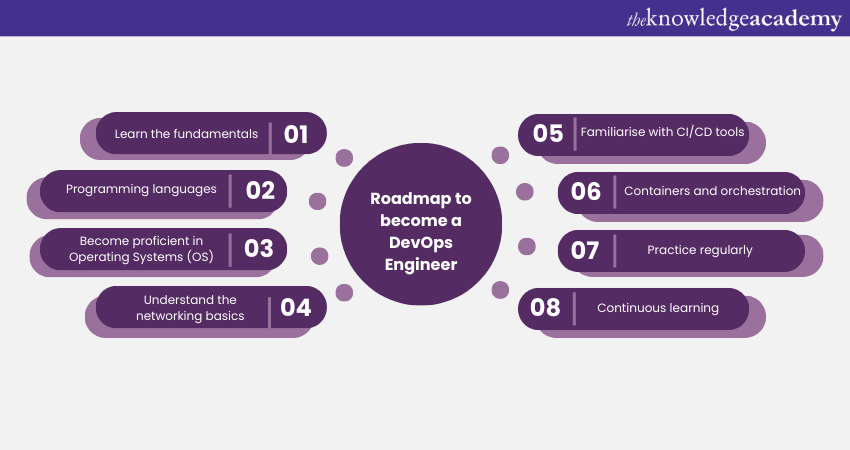
1) Learn the fundamentals: Start with a strong understanding of Software Development, system administration, and network basics. These fundamentals are the building blocks of DevOps.
2) Programming languages: Develop proficiency in at least one scripting language like Python, Ruby, or Bash. Additionally, it's beneficial to learn a programming language like Java or C++.
3) Become proficient in Operating Systems (OS): Gain a strong command of Linux and other OS since it is necessary to work in DevOps environments.
4) Understand the networking basics: Learn the essentials of networking, including concepts like TCP/IP, routing, and subnets.
5) Familiarise with CI/CD tools: Familiarise yourself with CI/CD tools such as Jenkins, Travis CI, GitLab CI/CD, or CircleCI. These tools automate the build, test, and deployment processes.
6) Containers and orchestration: Understand containerisation with Docker, which involves creating, managing, and deploying containers. Learn container orchestration with Kubernetes to efficiently scale and manage containerised applications.
7) Practice regularly: Apply your knowledge through personal DevOps projects, like setting up a CI/CD pipeline, deploying applications, and automating tasks.
8) Continuous learning: Keep yourself up-to-date with emerging DevOps practices and tools by reading blogs, attending conferences, and participating in online communities.
This DevOps Roadmap provides a structured approach, but your path may vary based on your specific interests and career goals within the DevOps field. The journey to inculcating DevOps Skills is continuous and dynamic, with a strong emphasis on hands-on experience. It's essential to maintain a problem-solving mindset and focus on automation, collaboration, and continual improvement to excel in this role.
Improve your chances at becoming a DevOps through our DevOps interview Questions.
Future of DevOps
The future of DevOps is likely to see further evolution and integration with emerging technologies and practices, driven by the continuous demand for faster delivery, improved quality, and increased efficiency in Software Development and operations. Some key trends and areas of development for the future of DevOps include:
1) DevSecOps: Integration of security practices into the DevOps workflow, aiming to embed security measures throughout the Software Development lifecycle. This involves automating security testing, implementing security controls as code, and fostering a culture of shared responsibility for security among development, operations, and security teams.
2) AIOps: Adoption of Artificial Intelligence (AI) and Machine Learning (ML) techniques to automate and optimise IT operations tasks such as monitoring, incident management, and troubleshooting. AIOps can help teams identify patterns, anomalies, and performance issues more efficiently, enabling proactive problem resolution and continuous improvement.
3) GitOps: Extension of DevOps principles to infrastructure and configuration management, where the desired state of infrastructure and applications is defined and managed using version-controlled repositories (typically Git). GitOps facilitates automated deployment, rollback, and drift detection, promoting declarative, auditable, and collaborative infrastructure management.
4) Serverless and Cloud-Native Technologies: Increasing adoption of serverless computing and cloud-native architectures, which enable organisations to build, deploy, and scale applications more rapidly and efficiently. DevOps practices will continue to evolve to accommodate the unique challenges and opportunities presented by serverless and cloud-native development, such as optimising deployment pipelines, managing microservices, and integrating with container orchestration platforms like Kubernetes.
5) Edge Computing: With the proliferation of Internet of Things (IoT) devices and Edge Computing infrastructure, DevOps practices will extend to the edge, requiring new approaches for managing and deploying software at distributed locations with limited connectivity and resources.
6) Site Reliability Engineering (SRE): Adoption of SRE principles and practices, which emphasise reliability, scalability, and performance of systems and applications. SRE complements DevOps by providing a framework for measuring and improving service reliability through practices such as error budgeting, Service Level Objectives (SLOs), and blameless postmortems.
Overall, the future of DevOps Services will continue to be shaped by advancements in technology, shifts in organisational culture, and evolving best practices, with a focus on enabling teams to deliver value to customers faster, more reliably, and with higher quality.
Conclusion
We hope you read and understand What is DevOps and its importance. It reduces the workload of Dev and Ops professionals. As a technique to enhance general performance, profitability, sales, and numerous other indicators and produce exceptional results.
Train in Agile Methodology with our Agile DevOps Professional Course!
Frequently Asked Questions

DevOps streamlines collaboration between development and operations teams, fostering faster delivery, improved quality, and greater efficiency.

Popular DevOps tools include Git for version control, Jenkins for CI/CD, Ansible for configuration management, Docker and Kubernetes for containerisation, Prometheus and Grafana for monitoring, Terraform for infrastructure as code, and Slack for collaboration.

The Knowledge Academy takes global learning to new heights, offering over 30,000 online courses across 490+ locations in 220 countries. This expansive reach ensures accessibility and convenience for learners worldwide.
Alongside our diverse Online Course Catalogue, encompassing 17 major categories, we go the extra mile by providing a plethora of free educational Online Resources like News updates, Blogs, videos, webinars, and interview questions. Tailoring learning experiences further, professionals can maximise value with customisable Course Bundles of TKA.

The Knowledge Academy’s Knowledge Pass, a prepaid voucher, adds another layer of flexibility, allowing course bookings over a 12-month period. Join us on a journey where education knows no bounds.

The Knowledge Academy offers various DevOps Certification, including Certified DevOps Professional Course, Certified Agile DevOps Professional Course and Certified SecOps Professional Course These courses cater to different skill levels, providing comprehensive insights into GitOps vs DevOps.
Our Programming & DevOps Blogs cover a range of topics offering valuable resources, best practices, and industry insights. Whether you are a beginner or looking to advance your DevOps skills, The Knowledge Academy's diverse courses and informative blogs have you covered.
Upcoming Programming & DevOps Resources Batches & Dates
Date
 Certified DevOps Professional (CDOP)
Certified DevOps Professional (CDOP)
Thu 13th Jun 2024
Thu 3rd Oct 2024
Thu 19th Dec 2024







 Top Rated Course
Top Rated Course



 If you wish to make any changes to your course, please
If you wish to make any changes to your course, please


